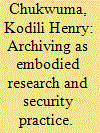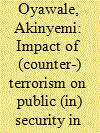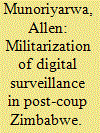|
|
|
Sort Order |
|
|
|
Items / Page
|
|
|
|
|
|
|
| Srl | Item |
| 1 |
ID:
189030


|
|
|
|
|
| Summary/Abstract |
This article explores the importance of embodiment in (research on) archival practices on state counter-terrorism policy in Nigeria. In doing so, the article seeks to contribute to the ongoing discussion around methodology and methods in critical security studies and other related fields in international relations by focusing on (researchers’) bodies as sites of knowledge production and intervention. Building on three empirical themes of fragmentation, labelling and gatekeeping that emerged from fieldwork in Abuja, Nigeria, I demonstrate how embodiment operates in active research contexts in the production – and problematization – of in/security. To do this, I draw inspiration from ideas around state archival practice; embodiment in critical security studies, especially as discussed in feminist and postcolonial work; and in/security theory to scaffold my broader methodological approach. A focus on embodiment, the article argues, marks the researcher’s body – and research – as integral to the development of theories and findings about security. At the same time, exploring the ways in which the (researcher’s) body is (re)produced in relation to identity and subjectivity encourages greater reflexivity in our research practice and fieldwork, as we are continually reminded that our work and our words are grounded in the standpoints that we occupy. The article concludes by identifying some useful strategies from my fieldwork for grappling with the challenges and tensions that emerge from bodily encounters in (security) research process.
|
|
|
|
|
|
|
|
|
|
|
|
|
|
|
|
| 2 |
ID:
189029


|
|
|
|
|
| Summary/Abstract |
This article examines the impact of (counter-)terrorism on public (in)security in Nigeria through engaging with non-elite understandings of ongoing conflicts in the northeast. Through 41 in-depth interviews carried out during a four-month fieldwork exercise with internally displaced persons in Nigeria, the article contributes to current (counter-)terrorism research on Nigeria and Africa by examining the lived experiences of non-traditional security ‘practitioners’, thus enriching current debates about ‘deepening’ and ‘broadening’ the security concept within critical security studies. The images of security that emerge show that the public in Nigeria adopt two main discursive devices, that is, a story and an interpretative repertoire, to discursively position themselves in relation to Boko Haram, the state and societal discourses and practices. Two discourses are prominent, namely a ‘(counter-)terrorist people’ discourse and a ‘kafir’ or ‘infidel’ discourse, which are constructed around ‘ethnic’ and ‘religious’ identities. This vernacular study of public understandings of (counter-)terrorism in Nigeria achieves three primary objectives: (i) it serves to invigorate debates around the meaning and practice of (in)security in Nigeria, (ii) it expands public (in)security debates on Africa, and (iii) it enriches vernacular research debate through foregrounding the experiences of groups and individuals who experience insecurity in their everyday lives.
|
|
|
|
|
|
|
|
|
|
|
|
|
|
|
|
| 3 |
ID:
189028


|
|
|
|
|
| Summary/Abstract |
The limitations of conventional accounts of security and peacebuilding drawing upon the ‘expert’ knowledge of military elites, policymakers and civil society representatives have been widely recognized. This has led security and peacebuilding policymakers, including through the United Nations Women, Peace and Security agenda, to search for alternative forms of knowledge, such as memoirs, photographs or oral histories, that better reflect lived experiences within local communities. Building on existing work on memoirs as knowledge production artefacts and on feminist security studies, this article demystifies experiential security knowledge through an analysis of three memoirs written by women ex-combatants in Uganda. We argue that while the memoirs offer complex and contradictory narratives about women ex-combatants, they are also the products of transnational mediated processes, whereby the interests of power translate complex narratives into consolidated representations and sturdy tropes of the abducted African woman ex-combatant. This means that although the three memoirs provide some hints as to transformative ways of thinking about security and peace, and offer dynamic accounts of personal experiences, they also reflect the politics of dominant representational practices.
|
|
|
|
|
|
|
|
|
|
|
|
|
|
|
|
| 4 |
ID:
189027


|
|
|
|
|
| Summary/Abstract |
Rectification as the return of sites of violence to prior use is little studied even as governments often defiantly reconstruct such sites and urge citizens to visit them as a way to combat ‘terror’. Using the case study of the 2013 Westgate shopping mall attack in Kenya and the subsequent return of the site to prior use, the article reflects on the broader practices of erasure of violence from public space as a unique form of a memory–security nexus. The article reads amnesia and its effects through material and social practices of rectification – renovation, fortification, closure and reopening, and the experiences of survivors and non-survivors in reinhabiting these spaces. The ways in which violence is vacated from space and speech, and the ways in which its absence is encountered by diverse people, produce a rich transcript on memory and its entanglements with security agendas. They also reveal the deleterious effects of politicized ‘triumphalist amnesia’ enlisted as a counter-terror tool, including the emotional tax and public distrust arising from non-recognition when memory is equated with vulnerability and forgetting with defiance. Triumphalist amnesia might produce the opposite effect – a failure to root out violence and insecurity among those asked to confront it.
|
|
|
|
|
|
|
|
|
|
|
|
|
|
|
|
| 5 |
ID:
189031


|
|
|
|
|
| Summary/Abstract |
While a large body of research has documented and theorized digital surveillance practices in various political contexts, little has been done to investigate the growing trend of military-driven digital surveillance practices in semi-authoritarian regimes. In this article, I use the case of the surveillance practices of the Zimbabwe Defence Forces to argue that scholarship needs to (re)evaluate this emerging trend. The article has three aims: first, it explores military-driven surveillance capabilities, the circulation of such capabilities and the surveillance tactics emerging in the semi-authoritarian context of Zimbabwe. Second, it examines the interface of factionalism and politics within the Zimbabwe Defence Forces and how this influences quotidian military-driven digital surveillance practices. Third, it locates military-driven surveillance practices within a growing and complex global political economy of trade in surveillance technologies that is centred on China. In doing so, the article helps locate a largely neglected but increasing practice of military-driven surveillance that is incrementally reconfiguring surveillance practices and architectures in semi-authoritarian regimes. Such a form of surveillance provides gateways for human rights abuses and shrinks the civilian spaces of protest and engagement, leading to digital authoritarianism. The article therefore calls for greater scrutiny of the emerging practice of military-driven digital surveillance in semi-authoritarian political contexts.
|
|
|
|
|
|
|
|
|
|
|
|
|
|
|
|
| 6 |
ID:
189032


|
|
|
|
|
| Summary/Abstract |
In 2019, the tiny West African country of the Gambia imposed a moratorium on all deportation flights from the EU. Though West African countries are notoriously reluctant to cooperate on forced returns, such a moratorium was unheard of and caused an uproar within diplomatic circles in Europe. In the age of deportability, why is deporting ‘unwanted’ migrants an illustration of a nation’s sovereign rights, yet refusing to accept deportees is not? The Gambian government used the moratorium to forestall political destabilization at a time of transition from a long dictatorship. With the moratorium, the government not only sought to protect deportees from violent removal practices but also served the interests of the Gambian population more broadly, among whom deportation remains deeply unpopular. Drawing on original expert interviews and informal conversations carried out between 2017 and 2020, this article shows that the moratorium allowed the Gambia to enact its internal sovereignty through a (temporary) protective exclusion of its citizens. Given the asymmetric and colonial legacy of modern-day sovereignty between states, the moratorium was a legitimate renegotiation of established but questionable standards of interstate sovereignty.
|
|
|
|
|
|
|
|
|
|
|
|
|
|
|
|
|
|
|
|
|